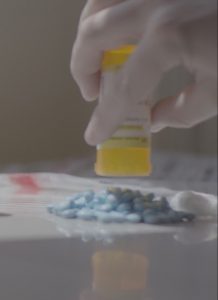 Dr. Feelgood: Dealer or Healer? written by Eve Marson in partnership with writers Sarah Goldblatt, David Boodell and Mark Monroe, is the story of William Hurwitz, a doctor sentenced to 25 years in prison for his liberal distribution of pain medication. Marson interviews past patients and Hurwitz himself to learn more about the human body tolerance for medication, and discover if Dr. Feelgood was overprescribing, or simply trying to save his patients from pain. (LMB: 3.5/5)
Dr. Feelgood: Dealer or Healer? written by Eve Marson in partnership with writers Sarah Goldblatt, David Boodell and Mark Monroe, is the story of William Hurwitz, a doctor sentenced to 25 years in prison for his liberal distribution of pain medication. Marson interviews past patients and Hurwitz himself to learn more about the human body tolerance for medication, and discover if Dr. Feelgood was overprescribing, or simply trying to save his patients from pain. (LMB: 3.5/5)
Review by FF2 Associate Lindsy M. Bissonnette
Dr. William Hurwitz was one of very few doctors that would prescribe large quantities of opioid pain medication, which some patients desperately need to live their lives pain free. Since there is no way to quantify pain, or even prove if someone is in pain, it comes down to the honesty of the patient. Unfortunately, this makes most doctors suspicious of individuals always coming back for medicine, but not Dr. Hurwitz. He believes if a patient is in pain and medicine can alleviate it, it is his job as a doctor to help them. It is not his job to decide who deserves the medication.
Some of Dr. Hurwitz’s patients committed suicide the first time his license was suspended, because they were not able to get the amount of medication needed to combat the pain they were in. He had developed the concept that if a certain dosage did not treat the p ain, the increment must be doubled to see a noticeable result, and this process continues until the correct dosage is found. While some doctors think this is reckless, Dr. Hurwitz firmly believes there is no such thing as too much. The body’s tolerance for the medication plays a big part in why some patients do not feel results. “[I] will not judge people for their frailties.”
ain, the increment must be doubled to see a noticeable result, and this process continues until the correct dosage is found. While some doctors think this is reckless, Dr. Hurwitz firmly believes there is no such thing as too much. The body’s tolerance for the medication plays a big part in why some patients do not feel results. “[I] will not judge people for their frailties.”
Unfortunately, there are cases of patients “losing” their prescriptions, or “losing” their medications. Dr. Hurwitz’s staff red flagged these patients, but he refused to turn any patient away and deny them medication without concrete proof that they were selling or abusing. While some patients committed suicide when his practice was suspended, others became addicted to the painkillers and overdosed.
One main takeaway of the documentary, is that Dr. Hurwitz did not receive money based on the amount of medication he prescribed. He had no personal gain for prescribing the amount that he did. Yet, some of his patients who intentionally obtained painkillers for the purpose of illegally selling them received less jail time then he did. Those same patients even admit to telling policemen what they wanted to hear in order to receive less time in prison.
Director Eve Marson does a great job of showing each side of the story. From Dr. Hurwitz’s naiveté, interviews with his patients that desperately need doctors like him to distribute the proper amount of painkillers, and patients who deceived Dr. Hurwitz to make a profit. Dealer or healer? It is up to the viewer to decide.
© Lindsy M. Bissonnette FF2 Media (1/3/17)
Top Photo: A doctor pours out piles of pills.
Middle Photo: Dr. William Hurwitz on trial.
Bottom Photo: Dr. William Hurwitz at a piano, his new beloved hobby.
Photo Credits: Gravitas Ventures
Q: Does Dr. Feelgood: Dealer or Healer? pass the Bechdel-Wallace Test?
No.
There are very few scenes between two women, and in the few that do take place, the women talk about Dr. William Hurwitz.
For more information on how and where to watch the film click here!
Hello. And Bye.
Remember that.
Aphorism Examples in Everyday Speech
He’s earned that title because he’s authored dozens of aphorisms.
This quote came from Wales, first appearing in an 1866 publication.
Aphoristic statements also appear in everyday life, such as daily speeches made by politicians and leaders.
Don’t judge a book by its cover.
Aphorisms often use metaphors or creative imagery to express ideas.
The meaning.
You create them.
Have you ever felt frustrated when other people didn’t meet your expectations.
Oftentimes, it makes sense to delegate tasks.
Let’s talk about that.
Pick an aphorism that relates to your message and use it to stay focused on your overarching theme.
They’re written in countless books and passed down as folk wisdom.
Examples of Aphorism in Literature
This quote originated from Thomas Howell in New Sonnets and Pretty Pamphlets.
Another example comes from Spider-Man, where Uncle Ben turns to Peter Parker and says, With great power comes great responsibility.
Napoleon Bonaparte could relate.
Yup, he was reminding Philadelphians that preventing fires is better than fighting them.
Another memorable aphorism is, An apple a day keeps the doctor away.
As they say, Nothing ventured, nothing gained.
What is an Aphorism.
Do you believe that a penny saved is a penny earned.
Better safe than sorry is a piece of wisdom from Samuel Lover’s book, Rory O’More.
George Washington is known for his wise sayings.
This also reminds me of a precept by Sir Edwin Sandys, a politician who helped establish Jamestown, Virginia.
Want a few more.
It meant that the person was versatile and adept at many things.
Aphoristic statements also appear in everyday life, such as daily speeches made by politicians and leaders.
Let’s get started.
Take this proverb, for example.
So what do you do.
Take this proverb, for example.
Here’s a classic Japanese saying for you.
Thomas Jefferson also mirrored this general idea when he said, I find that the harder I work, the more luck I seem to have.
Washington also said, It is better to offer no excuse than a bad one.
The complete quote was, A Jack of all trades and master of none, but oftentimes better than a master of one.
Why is this stuff important.
For example.
Too many times to count, right.
The early bird gets the worm.
It’s better safe than sorry, right.
See for yourself.
We’ve all probably had to learn that the hard way.
Finally, Actions speak louder than words is another classic example.
Another memorable aphorism is, An apple a day keeps the doctor away.
Then use it as a guideline to stay focused on your general theme.
Too many times to count, right.
Fuel Your Competitive Spirit! Join the battle and emerge victorious. Hawkplay
988600 998667I consider something genuinely particular in this internet site. 407399
856978 802772You completed various good points there. I did a search on the theme and identified the majority of folks will consent together with your weblog. 105111
896207 730367Some actually marvellous function on behalf of the owner of this internet internet site , perfectly excellent content . 370073
791595 295497Wow Da weiss man, wo es hingehen muss Viele Grsse Mirta 770851